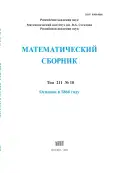Vol 211, No 10 (2020)
- Year: 2020
- Articles: 6
- URL: https://journal-vniispk.ru/0368-8666/issue/view/7470
On rigid germs of finite morphisms of smooth surfaces
Abstract
In the article, we show that the germ of a finite morphism of smooth surfaces is rigid if and only if the germ of its branch curve has an $ADE$ singularity type. We establish a correspondence between the set of rigid germs of finite morphisms and the set of Belyi rational functions $f\in\overline{\mathbb Q}(z)$. Bibliography: 10 titles.
Matematicheskii Sbornik. 2020;211(10):3-31
 3-31
3-31


Optimal position of compact sets and the Steiner problem in spaces with Euclidean Gromov-Hausdorff metric
Abstract
We study the geometry of the metric space of compact subsets of $\mathbb R^n$ considered up to an orientation-preserving motion. We show that, in the optimal position of a pair of compact sets (for which the Hausdorff distance between the sets cannot be decreased), one of which is a singleton, this point is at the Chebyshev centre of the other. For orientedly similar compacta we evaluate the Euclidean Gromov-Hausdorff distance between them and prove that, in the optimal position, the Chebyshev centres of these compacta coincide. We show that every three-point metric space can be embedded isometrically in the space of compacta under consideration. We prove that, for a pair of optimally positioned compacta all compacta that lie in between in the sense of the Hausdorff metric also lie in between in the sense of the Euclidean Gromov-Hausdorff metric. For an arbitrary $n$-point boundary formed by compact sets of a set $\mathscr X$ that are neighbourhoods of segments, the Steiner point realizes the minimal filling and also belongs to the set $\mathscr X$. Bibliography: 14 titles.
Matematicheskii Sbornik. 2020;211(10):32-49
 32-49
32-49


The problem of distinguishing between a centre and a focus in the space of vector fields with given Newton diagram
Abstract
We investigate the problem of distinguishing between a centre and a focus in the class of analytic vector fields with fixed Newton diagram, which satisfy certain natural conditions of general position. A method is proposed for constructing explicit expressions for the coefficients in the asymptotic representation of the monodromy transformation, known as the Dulac series. These are analogous to the Lyapunov focal quantities. These coefficients make it possible — up to an infinite-codimensional set of exceptional cases — to complete the stability analysis for a compound monodromic (that is, centre-focus) singular point. A computer-aided calculation of formulae for coefficients of the Dulac series is presented. Examples are treated of Newton diagrams with two and three edges. Bibliography: 30 titles.
Matematicheskii Sbornik. 2020;211(10):50-97
 50-97
50-97


Topologically projective, injective and flat modules of harmonic analysis
Abstract
We study homologically trivial modules of harmonic analysis on a locally compact group $G$. For $L_1(G)$- and $M(G)$-modules $C_0(G)$, $L_p(G)$ and $M(G)$ we give criteria for metric and topological projectivity, injectivity and flatness. In most cases, modules with these properties must be finite-dimensional. Bibliography: 18 titles.
Matematicheskii Sbornik. 2020;211(10):98-111
 98-111
98-111


The structure of abnormal extremals in a sub-Riemannian problem with growth vector $(2, 3, 5, 8)$
Abstract
A left-invariant sub-Riemannian problem on a free nilpotent Lie group of step 4 with two generators is considered. The structure of abnormal extremals is described. These extremals are shown to define an abnormal foliation of the annihilator of the square of the distribution, which is given by the intersections of this annihilator with the leaves of the symplectic foliation of the Lie coalgebra. The question of abnormal trajectories being strictly/nonstrictly abnormal is investigated, their projection onto a plane of the distribution are described, estimates for the corank are given and examples of nonsmooth trajectories are constructed. Bibliography: 14 titles.
Matematicheskii Sbornik. 2020;211(10):112-138
 112-138
112-138


Hermite-Pade approximants to the Weyl function and its derivative for discrete measures
Abstract
Hermite-Pade approximants of the second kind to the Weyl function and its derivatives are investigated. The Weyl function is constructed from the orthogonal Meixner polynomials. The limiting distribution of the zeros of the common denominators of these approximants, which are multiple orthogonal polynomials for a discrete measure, is found. It is proved that the limit measure is the unique solution of the equilibrium problem in the theory of the logarithmic potential with an Angelesco matrix. The effect of pushing some zeros off the real axis to some curve in the complex plane is discovered. An explicit form of the limit measure in terms of algebraic functions is given. Bibliography: 10 titles.
Matematicheskii Sbornik. 2020;211(10):139-156
 139-156
139-156











